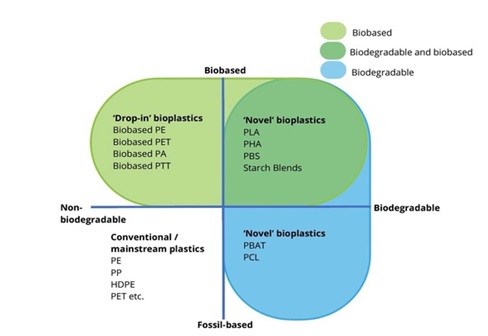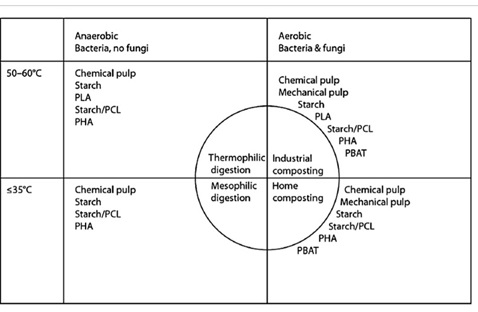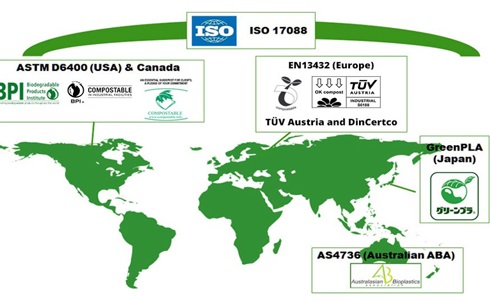
|

|

|
|
BIODEGRADABLE / COMPOSTABLE PLASTICS
|
|
Please find attached lecture presentation by Dr. Anomitra Chakravarty on Corn starch blend biodegradable polymers (Please click on this link to access the presentation) delivered at a seminar organized by Indian Institute of Chemical Engineers (IIChE) - North India Chapter on 9th January 2021 --- in PDF format for your reference. Hope you find the presentation interesting & informative. Please find attached article by Dr. Anomitra Chakravarty Compostable Plastics – on the cusp of a grand arrival published in INSIGHTS journal by PlastIndia Foundation. Please find link below for electronic version of the Insights journal Jan – March 2021 edition (see page 12) Hope you find the article interesting & informative. Please click on this link to access the article We have produced various bio-degradable / compostable compounds like (a) Thermoplastic Starch pellets (from corn starch)(b) PBAT + Thermoplastic Starch blend compound for extrusion blown film (c) PBAT + PLA + Thermoplastic Starch blend compound for extrusion film (d) PBAT + PLA blend compounds (with mineral filler) for extrusion blown film (e) Thermoplastic Starch + Polyvinyl Alcohol blend compound for film (water soluble film) (f) PLA + Thermoplastic Starch blend compound (g) PLA based compound for extrusion lamination (coating) on paperboard for disposable table ware (h) PLA based compound for extrusion of sheet (for thermoforming) and PLA + PBS based compound for Drinking Straws Thermoplastic Starch and its blend with PBAT & PLA You will be pleased to know that we have produced Thermoplastic Starch (TPS) pellets on an industrial scale first time in india with our clients. TPS was produced from corn starch. The TPS produced was blended with biodegradable polyester to produce PBAT + TPS blend compound pellets and extrusion blown film which is 100% biodegradable & compostable as per Indian and international test standards (IS / ISO 17088). The extrusion blown film is used to make carry bags, shopping bags, garbage bags, packing of fruits & vegetables, apparel packing, consumer & industrial packaging which is 100% biodegradable & compostable. Blending TPS with PLA and / or PBAT presents an excellent opportunity to reduce cost, increase rate of compostability (biodegradability) as well as increase the biobased content of the compound. Mechanical properties of the blend compound are very good. One might argue that adding mineral fillers like talc / CaCO3 to PLA / PBAT compounds can also reduce cost, but this will neither increase rate of compostability nor increase biobased content of the compound. Mineral fillers added to the compound do not produce compost on biodegradation. Thermoplastic starch is blended with bio-degradable plastics like Polylactic Acid (PLA), Polybutylene Adipate co-Terephthalate (PBAT) and cellulose fillers like wood fiber, bagasse fiber to improve mechanical properties, strength and resistance to water / moisture of the compound. We have also produced Thermoplastic Starch (TPS) & Polyvinyl Alcohol (PVA) blend polymer compound pellets and extrusion blown film on an industrial scale in India with our clients. Thermoplastic Starch and polyvinyl alcohol blend thermoplastic is bio-degradable in open landfill. The TPS – PVA plastic blend film does not drip when burned, does not stick to hot iron (unlike LDPE) and is completely soluble in water (hence does not cause marine pollution). Thermoplastic Starch (TPS) is a versatile bio-polymer obtained from renewable agricultural resources such as corn, wheat, potato, rice, cassava and tapioca harvests. Starch based plastic materials are completely bio-degradable and compostable. Starch based plastic blends are environment friendly, have low carbon footprint, require much lower energy for manufacture and are based on abundantly available, low cost & renewable raw material. Commercial corn starch is an ideal raw material for the production of Thermoplastic Starch. It is readily available, relatively inexpensive and easy to process. Polyvinyl Alcohol (PVA) is a water soluble and bio-degradable polymer which has excellent film forming properties along with high tensile strength and flexibility. PVA is blended with thermoplastic starch to reduce cost and the blend is soluble in water (hot / ambient) depending on degree of hydrolysis of the PVA polymer. All the compounds are well proven, meeting required mechanical properties for end applications and are completely compostable as per ISO / IS test standard 17088. We are a Project & Technical Consultancy organization with long expertise in the field of bio-plastics and specialty polymer products. We can offer complete technical assistance for the manufacture of Bio-degradable Plastics and end products. As a first step we can prepare a Techno Economic Project Report that will provide a realistic picture and help you to take an informed business decision, approach banks for project finance and government departments for statutory approvals. Once you decide to go ahead, we can provide complete technical services for setting up of manufacturing plant - selection of machinery, plant layout design, selection of utilities and support equipment, commissioning of plant, compounding and processing know-how, sourcing of raw materials & additives, quality control and testing, product technical qualification, target market segments, end application know-how, market intelligence etc. We have set up (are in the process of setting up) many such bio-degradable plastic compound & film production plants in India. We are actively working with clients for production trial & testing of other bio-degradable / biobased compounds like (a) Multilayer packaging film based on Poly-Hydroxy-Alkanoates (PHAs) with PHA blend outer and inner sealant layers and middle metallized layer.(b) LDPE + Thermoplastic Starch blend compound for extrusion blown film (c) PP + Thermoplastic Starch blend compound for cast film (d) Multilayer packaging film with outer layer based on PBSA and inner layer a blend of TPS + LDPE / LLDPE + Pro-oxidant + Bio enzyme (testing as per ISO / IS 17556 – 2019 for biodegradation in soil) (e) Multilayer packaging film with various layer based on blends of PLA & amorphous PHAs and crystalline PHAs (testing as per ISO / IS 17088 – 2021, industrial composting) (f) Multilayer film with outer layer based on PBAT + TPS and inner layer a blend of crystalline PHAs (OK home compostable testing) The only sustainable solution for phase-out of petrochemical based single use plastics. The phase-out must be in conjunction with availability of alternative eco-friendly materials. The top of the list eco-friendly materials are bio-degradable and compostable plastic materials that can replace single use plastics from petroleum sources. These materials include corn starch-based plastics, cellulose-acetate based plastics and other special grades of biodegradable plastics like PBAT, PLA, PHAs, PBS, PBSA, PBST etc. Some of these biodegradable plastics are produced from biological sources like PLA and PHAs. Some like PBAT & PBS are produced from petrochemical sources but are completely biodegradable and compostable. Conventional, Biobased & Biodegradable Plastics Types of biological waste treatment of biodegradable polymers PLA or Polylactide (also known as Polylactic Acid polymer) is a versatile commercial biodegradable & compostable thermoplastic based on lactic acid. Lactic acid monomers can be produced from 100% renewable resources like corn, sugar cane, sugar beets etc. PLA can replace the conventional petroleum-based thermoplastics like HDPE / PP / PS, due to the excellent combination of properties it possesses. PLA is an aliphatic polyester and is produced by formation of lactide monomer first and then the lactide monomer put through ring opening polymerization usually using metal alkoxides as catalysts resulting in high molecular weight polyester – PLA. However, there are some disadvantages associated with PLA
In order to improve its properties, PLA is blended with other materials. PLA is blended with mineral fillers such as precipitated ultrafine CaCO3 to improve impact toughness. PLA is blended with Corn Starch thermoplastic to improve properties and reduce cost while at the same time the blend is completely bio-degradable. PLA is also blended with other bio-degradable plastics (like PHA’s, PBAT, PBS) to improve flexibility while keeping the blend completely bio-degradable. PLA is also blended with cellulose fibers like wood flour, rice husk, bagasse, wheat straw etc. PHAs (Poly-Hydroxy-Alkanoates or polyhydroxy fatty acids) is a family of biobased polyesters that are suitable for even the most challenging convenience food applications. PHAs are biodegradable, readily compostable thermoplastics, produced by microbial fermentation of carbon-based feedstocks. The properties of PHA polymers are customizable to the application, depending on the specific combinations of different monomers incorporated into the polymer chain. PHAs can be produced from low-cost industrial by-products like molasses / whey / raw glycerol and organic waste feedstocks like Ligno-cellulosic crop by-products (rice husk, bagasse, rice bran etc.), vegetable waste (e.g. potato skin peels), vegetable oils / waste cooking oil and various other organic sources. Examples of PHAs are poly-4-hydroxybutyrate (P4HB); poly-3-hydroxybutyrate (P3HB); poly-3-hydroxyvalerate (P3HV) ; poly(3-hydroxybutyrate-co-3-hydroxyvalerate) or PHVB co-polymer ; poly (3-hydroxybutyrate-co-3-hydroxyhexanoate) or PHBH etc. The PHA-platform is made up of a large variety of bioplastics raw materials made from many different renewable resources. Depending on the type of PHA, they can be used for applications in films and rigid packaging, biomedical applications, automotive, consumer electronics, appliances, toys, glues, adhesives, paints, coatings etc. Beverage applications require polymers that maintain their properties when in contact with liquids up to 100 ºC that PHA copolymers can easily sustain. PBS or Polybutylene Succinate is a biodegradable and compostable polyester, which is produced from succinic acid, 1,4-butanediol and a third monomer which is an organic di-acid. New biotechnological routes now allow the production of succinic acid based on renewable feedstocks, such as glucose, sucrose and biobased glycerol. PBS is a crystalline polyester with a melting temperature exceeding 100°C, which is important for applications that require a high temperature range. PBS grades of different melt flow index (MFI) can be produced that are suitable for extrusion, injection moulding, thermoforming and film blowing. Copolymers of PBS like PBST or Poly (butylene succinate - terephthalate) and PBSA or Poly (butylene succinate - adipate terephthalate) possess good biodegradability along with desirable physical properties. PBAT or polybutylene adipate co-terephthalate is a biodegradable random co-polymer. The polymer is a co-polyester of adipic acid, 1,4-butanediol and purified terephthalic acid (PTA). It is produced by random co-polymerization of 1,4-butanediol, adipic acid, and dimethyl terephthalate (DMT) monomers. Main advantage of PBAT is that it is a fully biodegradable alternative to LDPE, having similar properties including high flexibility and toughness, allowing it to be used for various packaging applications. Biobased content in the polymer can be as high as 50% if 1,4-butanediol (BDO) from renewable sources is used. PBAT is modified (blended) with thermoplastic starch (TPS) to reduce compound cost, increase bio-degradability of the compound, increase bio-based content of the compound and improve blown film properties. PBAT is used as a toughening agent for PLA. Compound blend of thermoplastic corn starch, PBAT and PLA is used for blown film applications and extrusion of drinking straws (cold). Applications of PHAs, PBAT & PBS include coating for disposable paper cups and plates, disposable plastic cutlery, food delivery containers, cling wrap for food packaging, compostable plastic bags for gardening and agricultural use, water resistant coatings for paperboards, additive for more rigid biodegradable plastics (like PLA) to impart flexibility while maintaining full biodegradability of the final blend. Global Compostability Testing Standards |


